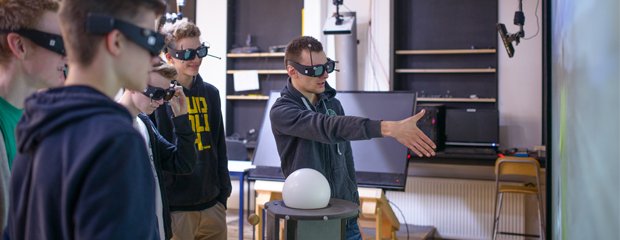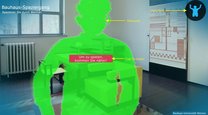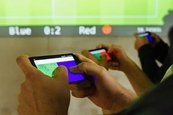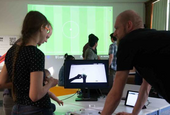Who we are
Design and development of intelligent software systems and interfaces have become increasingly important with the pervasiveness of mobile devices and ubiquitous technologies. In the English-language Human-Computer Interaction Master of Science programme, students focus on theoretical and practical issues in current Computer Science research in interface design and interactive system development. As a consecutive program teaching HCI at an advanced technical level, it requires students to have a solid background in computing-related subjects.
This technically-oriented HCI master’s degree programme further offers the opportunity to participate in interdisciplinary projects and to attend courses from other study programs, such as Media Art and Design, Product Design, Media Architecture, Media Management or faculties, such as Architecture and Urban Design, Art and Design, or Civil Engineering.
Weimar is a great place to live and study. For more information see our page on Studying in Weimar.
Please check out detail information about entry requirements, how to apply and application modalities and see our FAQ page (directed in particular at applicants from outside Germany).
The HCI Master program was started in winter semester 2014/15 and initially accredited by ACQUIN on March 31st 2016. This was extended in 2019 and again in 2022, with the current accreditation running until 2030.
The programme
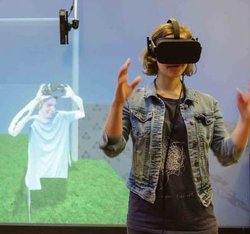
This international master’s degree programme is based on the following two basic pillars:
- The study of a range of current topics within the field of human-computer interaction and psychology: usability, user-centred design and user interface testing, HCI research methods, physiological computing and innovative interface technologies such as virtual reality, mobile systems, adaptive systems, mixed reality, ubiquitous computing, image analysis, and graphic interfaces.
- The acquisition of key skills and competences through a project-based study approach including active training of scientific communication, presentation and written skills in small groups.
Further information on the curriculum can be found » here.
Our Profile - we offer
- Current research topics: The specialist knowledge taught in our courses is based on our ongoing academic research and provides solid theoretical foundations, complemented by current issues and research results. Students are regularly involved in research and development projects during their research projects, theses and as student assistants.
- Skills from project-based studies: The scientifically-oriented projects require a high degree of independent acquisition of scientific knowledge and provide career-relevant key qualifications. They further provide opportunities for students to propose, implement and defend their first independent research initiatives.
- Scientific Literature: Access to scientific literature (online / on-site) for students is good and the selection available in the library is continually updated by our academic staff.
- Excellent lab infrastructure: The labs of our groups offer an excellent infrastructure for the implementation of projects and theses. Specific examples of facilities available for student use include the Usability, HCI, Computer Graphics, Virtual Reality, Mobile Media, and Computer Vision labs, as well as a multi-user 3D and a visual analytics display as well as facilities for working with electronics (physical computing).
- The new research building ‘Digital Bauhaus Lab’ offers students a working environment of the highest standard.
- Staff-student ratio: The Faculty of Media funds two teaching/research associates per Professor, who are involved in teaching. Most groups further have project-funded research associates who also supervise projects and theses. This ensures an outstanding staff-student ratio and direct and intensive contact between academics and students.
- Research orientation and publications: Students are frequently actively involved in international publication activities, often resulting from student research projects and theses. A significant proportion of prior Master graduates have proceeded in doctoral programmes inside and outside of Germany, and work in academic or research-oriented environments.
Faculty
The research-oriented master’s programme is taught by internationally renowned professors:
- Prof. Bernd Fröhlich (VR and Visualisation)
(winner of the virtual reality technical achievement award, co-founder of the IEEE Symposium on 3D User Interfaces, inaugural member of the IEEE Virtual Reality Academy in 2022, research on VR interfaces, multi-user and social VR, big data and scientific visualisation, information visualization, visual text analytics) - Prof. Eva Hornecker (HCI)
(Distinguished Member of the ACM, expert on innovative human-computer interaction concepts, user-centered design and museum installations, qualitative research methods, co-founder of the international ACM conference series 'Tangible Embedded and Embodied Interaction', spent 8 years of her career in the UK and New Zealand) - Jun. Prof. Jan Ehlers (Usability)
(psychologist, expert on Usability, brain computer interfaces, physiological computing, biofeedback, and pupillometry, detection of cognitive and affective states from physiological data,) - Prof. Volker Rodehorst (Computer Vision)
(computer vision and photogrammetry expert, 3D reconstruction, works with flying drones to survey buildings) - Jun. Prof. Jan Willmann (Faculty of Arts & Design - Theory & History of Design)
(expert on Theory and History of Design, digital design culture, fabrication technology, 3D printing, robotic printing)
In addition, for their Electives, students can hear classes from all other renowned members of the CS department, such as Prof. Benno Stein (Intelligent Information Systems, Natural Language Processing, Big Data and Machine Learning), Prof. Jan-Oliver Ringert (Software Engineering, model-based software development), Prof. Stefan Lucks (Information/Communication Security and Cryptology, co-developd the the Skein hash function), Prof. Charles Wüthrich (Computer Graphics, collaborates with an educational TV production institution, student projects on game development), Jun.-Prof. Maurice Jakesch (Computational Social Science, algorithmic culture, risks of Large Language Models, ), and PD Dr. Andreas Jakoby (Algorithm Engineering, Digital Watermarking), as well as take courses from throughout the University.








